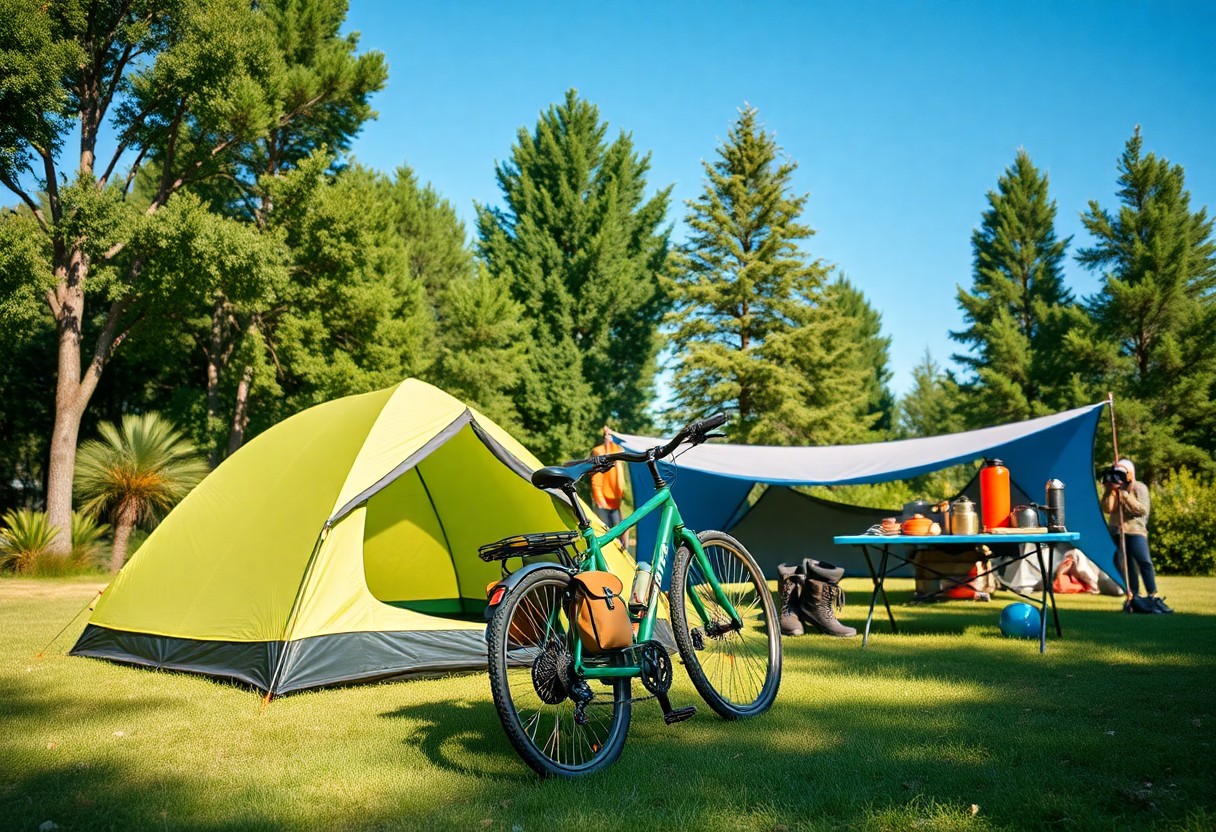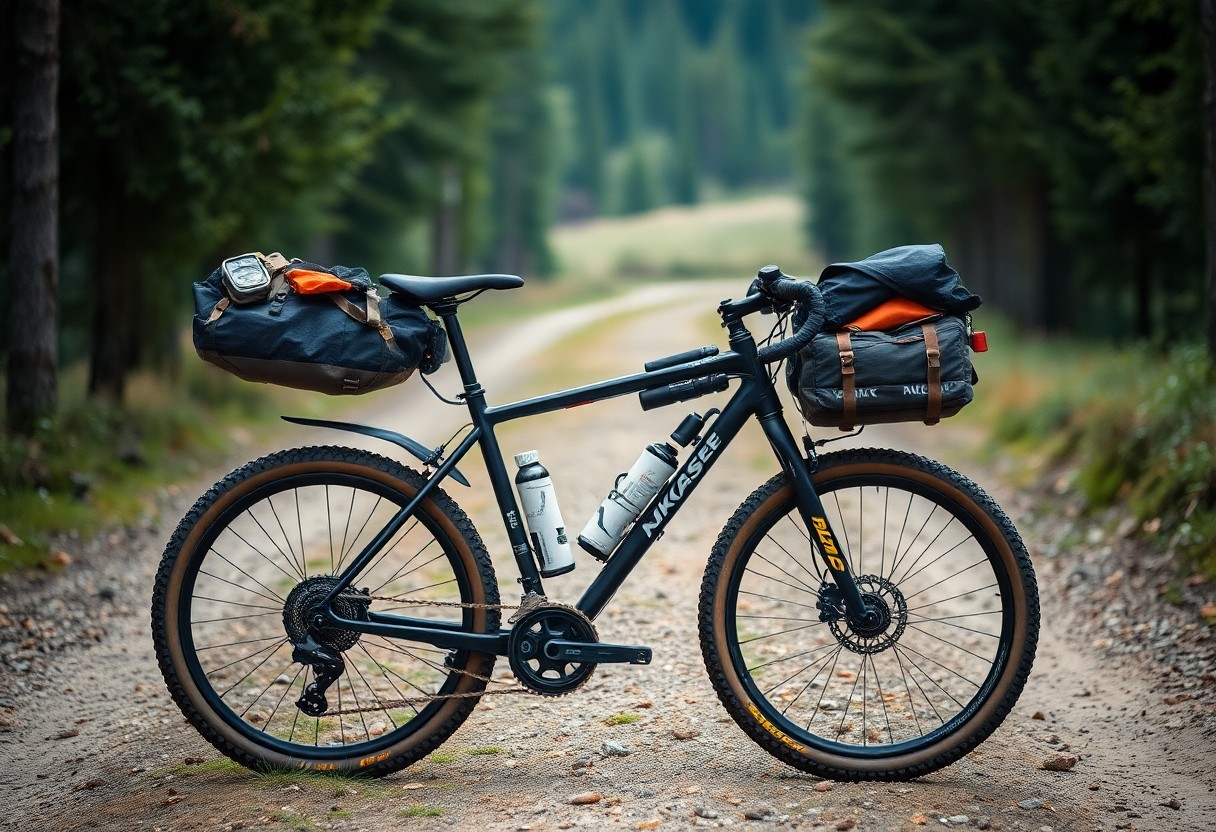Over packing can turn a delightful bikepacking adventure into an arduous struggle. To ensure your journey is both enjoyable and comfortable, it’s imperative to select lightweight gear that meets your needs. From durable tents and sleeping bags to compact cooking equipment, each item plays a key role in enhancing your experience. By making informed choices about your gear, you can minimise weight and maximise enjoyment, allowing you to focus on the landscapes and experiences that await you on the trail.
Key Takeaways:
- Invest in a high-quality, lightweight tent or tarp that offers good weather protection without adding unnecessary weight to your kit.
- Select a compact sleeping bag and sleeping mat, balancing warmth, comfort, and packability to enhance your sleeping experience while on the trail.
- Choose lightweight cooking gear and utensils that enable you to prepare easy meals without compromising on functionality or adding bulk to your load.
The Imperative of Cutting Weight: Why Lightweight Gear Matters
Reducing the weight of your gear can transform your bikepacking experience into a seamless adventure. By prioritising lightweight equipment, you enhance your ability to tackle challenging terrains effortlessly while boosting your overall endurance. Every gram counts; lighter gear allows you to maintain higher speeds and conserve energy for longer distances, ensuring you can enjoy the journey instead of labouring under excessive weight. Moreover, having quality lightweight gear can lead to increased confidence in taking on more ambitious routes.
The Impact of Gear Weight on Performance
The weight of your gear directly influences your performance on the bike. When you’re loaded down with heavy items, it can lead to fatigue more quickly, making each uphill pedal stroke feel laborious. A study by the Journal of Sports Science found that carrying just an extra 10% of your body weight can reduce your cycling efficiency significantly. Opting for ultra-light materials and streamlined designs not only enhances your speed but also contributes to a more enjoyable ride.
Psychological Benefits of Lightweight Packing
Carrying less gear creates a noticeable shift in your mindset. You’ll find that moving with a lightweight setup alleviates concerns about physical strain, allowing you to focus on the beauty of your journey. With each pedal stroke feeling less laborious, your journey becomes more about exploration and joy rather than endurance and discomfort.
The psychological advantages extend beyond mere physical ease. When you embrace a minimalist approach to packing, the freedom from cumbersome gear fosters a sense of adventure. This mindset shift enables you to appreciate the scenery around you, engage with your environment more deeply, and enjoy spontaneous detours. The lighter your load, the lighter your state of mind, leading to a more fulfilling and enriching bikepacking experience overall.

Essential Shelter Solutions: Choosing the Right Tent
Finding the right shelter for your bikepacking journey is fundamental in ensuring a restful night’s sleep and protecting you from the elements. The ideal tent provides the perfect blend of weight, durability, and weather resistance. You’ll want a tent that not only packs down small but is also intuitive to set up, allowing you to quickly establish your camp after a day of cycling.
Comparing Ultralight Tents and Bivvy Sacks
Comparison Table
| Feature | Ultralight Tents |
|---|---|
| Weight | Typically ranges from 1-2.5 kg |
| Space | More roomy, allowing for gear storage |
| Comfort | Good ventilation and protection from bugs |
| Setup | Requires poles and can take longer to pitch |
| Weather Resistance | Excellent, designed for varying conditions |
Features That Enhance Comfort and Ease of Setup
Comfort during your bikepacking trip depends significantly on your tent’s features. Look for quick-pitch designs that simplify setup in various terrains, enabling you to enjoy your surroundings sooner. Features like multiple entrances facilitate easy access and ventilation, while built-in footprints safeguard the tent floor against wear. Consider additional components like gear lofts and interior pockets for better organisation of your possessions, adding to your overall convenience while camping.
An efficient tent maximises your comfort and minimises hassle after a long day of riding. Choosing lightweight options with practical features such as colour-coded poles or integrated rainflys can dramatically reduce setup time and enhance your experience in the wild. Prioritising these attributes means you’ll spend less time fussing with your gear and more time enjoying the great outdoors.
Sleep Systems: Maximising Comfort without the Bulk
A well-planned sleep system transforms your bikepacking experience, granting you the ability to recover properly for the next day’s journey without weighing you down. Opt for compact and lightweight options, ensuring that you remain both comfortable and versatile during your adventure. Your choice of sleeping gear plays a pivotal role in how well you rest, ultimately impacting your performance on the bike.
The Best Sleeping Bags for Bikepackers
Choose a sleeping bag that offers an excellent balance between warmth and weight. Down insulation is a popular choice among bikepackers due to its superior warmth-to-weight ratio, but ensure it’s treated for water resistance. A bag rated for a temperature slightly below your expected conditions will keep you snug without adding unnecessary bulk to your setup.
Optimal Sleeping Pads for Weight and Insulation
Your sleeping pad is vital for insulation against the cold ground and cushioning for a comfortable night’s sleep. Look for pads that are lightweight, compact, and offer sufficient thermal resistance. Inflatable models provide better insulation compared to foam pads; however, the best choice often comes down to the balance between durability and weight.
For a perfect night’s sleep, consider inflatable sleeping pads with an R-value around 3 to 4, which provides adequate insulation for three-season use. Brands like Therm-a-Rest and Sea to Summit offer models weighing under 500 grams, yet comfortable enough for restorative sleep. Moreover, integrating a packable closed-cell foam pad can serve as a backup and extra insulation, adding versatility without compromising your pack weight. Prioritising these factors ensures you’ll wake up refreshed, ready to tackle the miles ahead.
Cooking Essentials: Lightweight Solutions for Trail Meals
Efficient cooking while bikepacking not only enhances your meals but also fuels your adventure. By prioritising lightweight, compact gear, you can enjoy delicious, nutritious meals without the bulk. Emphasising multi-use items will streamline your cooking process, while easy-to-prepare ingredients minimise meal prep time. With the right cooking imperatives, you can savour satisfying trail meals that keep your energy levels high throughout your journey.
Evaluating Portable Stoves and Cookware
Choose portable stoves designed for lightweight travel, such as canister stoves or alcohol burners, which easily fit into your kit. Look for options like the MSR PocketRocket, known for its reliability and efficiency. Pair your stove with compact cookware, ideally made from titanium or aluminium, which reduces overall weight while ensuring even heating. Avoid unnecessary components; focus on imperatives that serve multiple functions.
Creating a Minimalist Food Menu that Fuels Adventures
A minimalistic food menu streamlines your bikepacking experience while providing the nourishment needed for long days on the trail. Focus on lightweight, calorie-dense foods such as nuts, dried fruits, and energy bars that sustain you without weighing you down. Incorporate easily cooked options like instant oatmeal, couscous, or dehydrated meals that require minimal preparation. This approach not only lightens your load but also simplifies meal planning and cooking.
Creating a balanced food menu means selecting foods that are nutritious, energising, and easy to prepare. Opt for meals rich in carbohydrates, proteins, and fats to sustain energy levels during your rides. For instance, a combination of whole grains, legumes, and powdered drink mixes can provide imperative nutrients without the excess weight. Pre-pack portions in resealable bags to save space and keep ingredients organised, ensuring you can whip up satisfying meals on the go.
Hydration Strategies to Stay Light and Efficient
Staying hydrated while bikepacking is important for performance and overall comfort. You’ll want to employ strategies that balance efficiency with minimal weight. Focus on lightweight, reliable hydration systems that allow you to carry enough water without adding unnecessary bulk. Exploring innovative filtration options and smart bottle choices will help keep your gear pack manageable while ensuring you have access to clean drinking water throughout your adventure.
Innovative Water Filtration Systems
Innovative water filtration systems now offer powerful solutions for bikepackers aiming to reduce pack weight. Brands like Sawyer and Katadyn provide compact filters that remove harmful bacteria and protozoa from natural water sources. These filters can be easily attached to your water bottles or used with hydration reservoirs, ensuring you can refill quickly and travel light while staying hydrated.
Smart Bottle Choices for Weight and Convenience
Your choice of water bottles can significantly affect your bikepacking experience. Lightweight options like collapsible silicone bottles or durable, stainless steel models blend convenience with functionality. Paying attention to weight, ease of use, and design features will enhance both your hydration strategy and overall ride.
When opting for smart bottle choices, consider products that integrate filtration and insulation features. HydraPak offers lightweight, collapsible models that can be easily stowed when empty, while brands like Klean Kanteen provide insulated bottles that keep your drinks hot or cold for hours. The right options help you maintain hydration without adding cumbersome weight to your load, letting you focus on the ride ahead rather than your gear.
To wrap up
Considering all points, assembling the right lightweight gear is key to ensuring your bikepacking adventure is both enjoyable and comfortable. Focus on selecting items that are versatile, compact, and tailored to your personal needs, including a suitable tent, sleep system, cooking equipment, and clothing. Don’t overlook the importance of reliable tools and safety gear to facilitate a smooth journey. By prioritising these crucials, you can enhance your overall experience and embrace the freedom of the open road with confidence.
FAQ
Q: What types of lightweight gear are necessary for my bikepacking trip?
A: When preparing for a bikepacking adventure, there are several necessary lightweight gear items to consider. A good quality tent or a bivvy bag provides shelter without adding excessive weight. A compact sleeping bag suitable for the climate you’ll be in is necessary for comfort at night. Additionally, a lightweight sleeping mat will offer insulation and cushioning. Food preparation tools, such as a portable stove and lightweight cookware, are also important. Lastly, a reliable hydration system or water filter will ensure you have access to clean drinking water throughout your journey.
Q: How can I pack my gear to maintain a comfortable balance and stability while cycling?
A: Achieving a comfortable balance while bikepacking requires thoughtful packing. It is advisable to distribute weight evenly across your bike. Place heavier items, such as your tent or cooking gear, near the centre of the bike to maintain stability and keep the handling smooth. Lighter items, such as clothing and food, can be placed in the rear panniers or on a front rack. It’s also helpful to pack frequently-used items in easily accessible areas, allowing for quick access without having to dig through all your gear.
Q: Is it necessary to invest in specialised bikepacking gear, or can I use my existing cycling equipment?
A: While it is possible to use existing cycling equipment, investing in specialised bikepacking gear can enhance your experience significantly. Traditional cycling gear may not provide the lightweight and compact options that bikepacking gear does. Specialised items, such as bikepacking bags designed to fit specific bike frames, can save space and improve aerodynamics. Additionally, lightweight tents and sleeping systems designed for outdoor adventures will generally be more suited to the rigours of prolonged cycling. Overall, while you may start with regular equipment, investing in gear tailored for bikepacking can greatly improve your comfort and efficiency.
